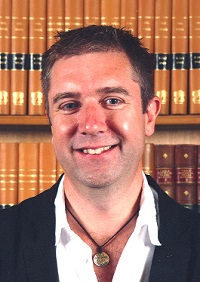Chemical Science is pleased to welcome Christopher Hunter as Associate Editor for Physical Organic chemistry.
 Biography
Biography
Christopher Hunter is Herchel Smith Professor of Organic Chemistry at the University of Cambridge. Originally from New Zealand, he moved to Northern Ireland at the age of four and completed his early education there. After receiving his undergraduate degree and PhD from Churchill College, Cambridge, he returned to his native New Zealand for a couple of years to lecture at the University of Otago. In 1991 he moved back to the UK, joining the University of Sheffield first as Lecturer and then as Professor, before taking up his current post at the University of Cambridge in September 2014.
Research
The Hunter Group’s aim is to establish a reliable set of rules that can be used for the design of non-covalent systems. Their research focuses on four main areas of development:
1. Fundamental investigations of the nature of intermolecular interactions
2. Molecular design of functional assemblies
3. Development of new methods for studying solvation and co-operativity
4. Computer modelling of intermolecular interactions
Awards
Chris’s recent awards include the RSC Physical Organic Chemistry Award (2011) and the RSC Tilden Prize (2009). In 2008 he was elected a Fellow of the Royal Society.
Publications
You can read some of the most recent work from the Hunter group in Chemical Science – click on the links below to get to the articles. All are either Open Access or free to access until 24th March:
| The flexibility–complementarity dichotomy in receptor–ligand interactions Hongmei Sun, Christopher A. Hunter and Eva Marina Llamas Chem. Sci., 2015, 6, 1444-1453 DOI: 10.1039/C4SC03398A, Edge Article |
| Open Access |
| pH-dependent binding of guests in the cavity of a polyhedral coordination cage: reversible uptake and release of drug molecules William Cullen, Simon Turega, Christopher A. Hunter and Michael D. Ward Chem. Sci., 2015, 6, 625-631 DOI: 10.1039/C4SC02090A, Edge Article |
| Open Access |
| Applications of dynamic combinatorial chemistry for the determination of effective molarity Maria Ciaccia, Irene Tosi, Laura Baldini, Roberta Cacciapaglia, Luigi Mandolini, Stefano Di Stefano and Christopher A. Hunter Chem. Sci., 2015, 6, 144-151 DOI: 10.1039/C4SC02347A, Edge Article |
| Open Access |
| A solvent-resistant halogen bond Craig C. Robertson, Robin N. Perutz, Lee Brammer and Christopher A. Hunter Chem. Sci., 2014, 5, 4179-4183 DOI: 10.1039/C4SC01746C, Edge Article |
| Open Access |
| Quantification of solvent effects on molecular recognition in polyhedral coordination cage hosts Martina Whitehead, Simon Turega, Andrew Stephenson, Christopher A. Hunter and Michael D. Ward Chem. Sci., 2013, 4, 2744-2751 DOI: 10.1039/C3SC50546D, Edge Article |
| Open Access |
A surface site interaction model for the properties of liquids at equilibrium
Christopher A. Hunter
Chem. Sci., 2013, 4, 1687-1700
DOI: 10.1039/C3SC22124E, Edge Article
From themed collection Physical Chemistry
van der Waals interactions in non-polar liquids
Christopher A. Hunter
Chem. Sci., 2013, 4, 834-848
DOI: 10.1039/C2SC21666C, Edge Article
From themed collection Physical Chemistry
Chris is now accepting submissions to Chemical Science in the area of physical organic chemistry. Submit your high-impact research to his Editorial Office.










